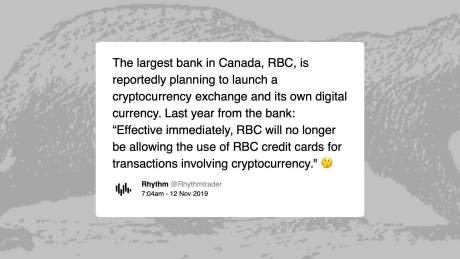The Royal Bank of Canada (RBC) is exploring building a cryptocurrency trading platform for both investments and in-store/online purchases.
This move would make the bank — the largest in Canada by market capitalization, with $661 billion CAD ($499 billion) in assets under management — the first in the country to launch a cryptocurrency exchange.
The trading platform would facilitate the buying and selling of individual digital coins, including Bitcoin and Ether, as well as bundled crypto assets. RBC also plans to offer customers the ability to open accounts to safely store their digital coins, according to The Logic
RBC Cryptocurrency Patents
Although full details surrounding the bank’s plans are not yet available, RBC has applied for four patents in Canada and the U.S that provide insights on how it plans to integrate cryptocurrency into its operations.
The U.S. patent applications, which were filed in April and became public in October, discuss how the bank can take advantage of the growing popularity of cryptocurrencies.
One patent reads: “To individual users, managing cryptographic keys and transacting with different cryptographic assets can be a challenge. In some situations, cryptographic asset transactions may take time to be confirmed, and/or may not be compatible or supported by merchant systems or point-of-sale devices.”
As of press time, RBC did respond to The Logic’s request for comment, including whether it plans to launch a cryptocurrency trading platform and if so, when it would launch.
“As part of the innovation and discovery process, RBC, like many other organizations, files patent applications to ensure proprietary ideas and concepts are protected,” RBC spokesperson Jean Francois Thibault said.
Change of Tune

RBC’s move may come as a surprise to some: last year, the bank abruptly banned its clients from purchasing cryptocurrencies with credit and debit cards, following similar moves by others like TD Bank and Bank of Montreal.
That said, in the past three years RBC has published 27 blockchain-related patents dealing with vehicle records, digital rewards, smart contracts, loan offerings, and a variety of investment vehicles.
Canada has a number of small cryptocurrency exchanges, but many have run into issues, regulatory and otherwise. Just last week, Vancouver-based Einstein Exchange, which owes customers over $16 million, filed for bankruptcy.
Earlier this year, Vancouver-based QuadrigaCX, which owes nearly $215 million, went bankrupt after its CEO died in 2018 and no one could obtain the information on the private key he used to access funds on the exchange.
RBC’s applications suggest how it plans to avoid those kinds of issues, ensuring that private keys are easily locatable, while also abiding by other regulations, such as anti-money-laundering provisions.


















